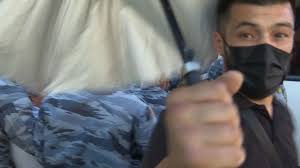
Pensioner Ernazar Perneev had just arrived at Nauryz Square in Kazakhstan's southern city of Shymkent on October 26 when he was confronted by a representative from the mayor's office.
You know, it's illegal to come here for a rally that has not been officially sanctioned," the official told Perneev, referring to a protest called by the banned Democratic Choice of Kazakhstan (DVK).
"The gathering we have here is about the interests of the Kazakh nation and the expansion of Chinese influence here," Perneev replied, as RFE/RL filmed the conversation. "It's about our future. Therefore, it doesn't matter if there is permission or not."
Suddenly, two masked men with umbrellas stepped between Perneev and RFE/RL's video camera.
"Who are these guys?" Perneev asked in surprise as the masked men opened their umbrellas to block RFE/RL's camera and prevent him from making further statements.
The incident is the latest in a series of confrontations between independent journalists and coordinated groups of unknown individuals who appear to be working under the direction of authorities to block reporting about protests in Kazakhstan, particularly those called by the DVK -- an opposition political movement led by self-exiled former banker and businessman Mukhtar Ablyazov.
Throughout June and July, masked men used umbrellas to block RFE/RL cameras from documenting police crackdowns at rallies in the capital Nur-Sultan, in Almaty, and in Shymkent.
The masked men often position themselves at strategic positions beside police buses used to transport detainees from protest sites -- springing into action with their umbrellas whenever a journalist tries to film an arrest.
They've even used their umbrellas to block RFE/RL interviews with police officers during the crackdowns.
Although it is a crime in Kazakhstan to interfere with the work of a journalist, police have never arrested or charged any of the umbrella men for the offense.
Video footage shot by RFE/RL shows some masked umbrella men getting out of police vehicles used to deploy security forces at checkpoints near planned DVK rallies.
In Nur-Sultan, Deputy Police Chief Bakhytzhan Malybaev has refused to take action against masked umbrella men who have interfered with RFE/RL journalists directly in front of him.
Malybaev rejected calls from those journalists for him to enforce the law, saying he was unable to identify the culprits because of their masks.
'Coordinated' Actions
Aiman Omarova, an attorney who represents RFE/RL's Kazakh Service, has filed formal legal complaints since June on behalf of 10 RFE/RL journalists who have been attacked or had their work blocked by umbrella men and other "unknown people."
Omarova maintains that police in Nur-Sultan and Almaty are complicit because of their repeated failure to arrest and pursue criminal charges against the "unknown" attackers.
Although prosecutors are obliged within two months to provide either a progress report on their investigation or a formal "refusal" notice to go forward on a complaint, Omarova has yet to receive official information about some of the cases.
The only information she has received on other cases is that the complaints have been forwarded to the local police departments involved.
Omarova says she is preparing a lawsuit charging investigators in Kazakhstan's Prosecutor-General's Office with failing to take action.
"I think the police have committed these illegal actions together with the umbrella men," Omarova says. "They have allowed these umbrella men to commit crimes against journalists."
"These umbrella men are working with the police, but also with other law enforcement agencies -- security agencies," Omarova says. "It is cooperation against journalists and it is coordinated."
"They don't want journalists to work freely because it will allow many people to see the illegal actions of the police," she says. "So, the rights of journalists are not being protected."
"Our legislation tries to demonstrate to society and to the international community that we have a free press in Kazakhstan," Omarova says. "In reality, the journalists aren't free here. Journalists are being blocked if they report voices that are critical of the government."
Pattern Of Disturbances
In fact, masked umbrella men aren't the only groups in Kazakhstan who have been interfering with journalists lately in apparent coordination with authorities.
On July 22, when lawyers and rights activists in Almaty attempted to hold a press conference at the headquarters of Kazakhstan's Bureau for Human Rights, a gang of about 20 unidentified athletic women stormed the event -- beating journalists and smashing their cameras as they shouted "don't film."
The press conference was meant to focus on the arrests of three women on charges of taking part in unsanctioned rallies and being members of the banned DVK movement.
Those who were attacked included correspondents and cameramen from RFE/RL, the private broadcaster Almaty TV, and the private KazTAG news agency.
None of the attackers have been arrested or charged, even though their violence was caught on video.
Although one of the attackers was briefly detained at the scene, she was released the same day without charge.
Since then, she has appeared at other anti-government events -- confronting and interrupting the work of RFE/RL correspondents.
Police in Almaty say they have not taken action against any of the women involved in the July 22 attack because they are unable to locate them.
Groups of "unknown" Kazakhs began confronting RFE/RL correspondents and other journalists in Kazakhstan on March 22 when police launched a crackdown on DVK protesters angered by the renaming of the country's capital after the outgoing president, Nursultan Nazarbaev.
In those confrontations, one group of Kazakhs dressed in traditional folk costumes blocked the filming of the arrests by dancing and singing in front of RFE/RL cameras.
Others used newspapers or their hands to block the media's coverage of the events.
Written by Ron Synovitz in Prague with reporting by Dilara Issa in Shymkent and by RFE/RL's Kazakh Service in Nur-Sultan and Almaty
Original source: AZATTYK





